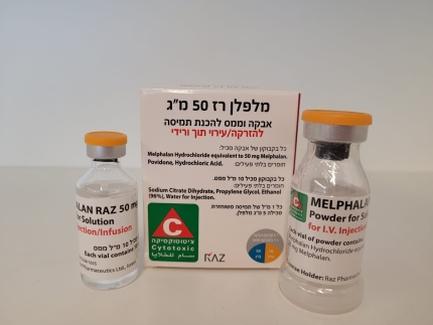Quest for the right Drug

מלפלן רז 50 מ"ג MELPHALAN RAZ 50 MG (MELPHALAN AS HYDROCHLORIDE)
תרופה במרשם
תרופה בסל
נרקוטיקה
ציטוטוקסיקה
צורת מתן:
תוך-ורידי : I.V
צורת מינון:
אבקה וממס להכנת תמיסה להזרקהאינפוזיה : POWDER AND SOLVENT FOR SOLUTION FOR INJECTION/INFUSION
עלון לרופא
מינוניםPosology התוויות
Indications תופעות לוואי
Adverse reactions התוויות נגד
Contraindications אינטראקציות
Interactions מינון יתר
Overdose הריון/הנקה
Pregnancy & Lactation אוכלוסיות מיוחדות
Special populations תכונות פרמקולוגיות
Pharmacological properties מידע רוקחי
Pharmaceutical particulars אזהרת שימוש
Special Warning עלון לרופא
Physicians Leaflet
Adverse reactions : תופעות לוואי
4.8. Undesirable effects For this product there is no modern clinical documentation which can be used as support for determining the frequency of undesirable effects. Undesirable effects may vary in their incidence depending on the indication and dose received and also when given in combination with other therapeutic agents. The following convention has been utilised for the classification of frequency: very common (≥1/10), common (≥1/100 to <1/10), uncommon (≥1/1,000 to <1/100), rare (≥ 1/10,000 to < 1/1,000), very rare (<1/10,000), not known (cannot be estimated from the available data). MedDRA system organ class Frequency Adverse reactions Neoplasms benign, malignant and Secondary acute myeloid leukaemia and unspecified (including cysts and Not known myelodysplastic syndrome (see section 4.4) polyps) Blood and lymphatic system disorders Very common Bone marrow depression, leading to leukopenia, thrombocytopenia, neutropenia1 and anaemia Rare Haemolytic anaemia Immune system disorders Rare Hypersensitivity2 (see skin and subcutaneous tissue disorders) Respiratory, thoracic and mediastinal Rare Interstitial lung disease and pulmonary fibrosis disorders (including fatal reports) Gastrointestinal disorders Very common At high dose: nausea, vomiting and diarrhoea; stomatitis Rare Stomatitis at conventional dose Hepato-biliary disorders Rare Hepatic disorders ranging from abnormal liver function tests to clinical manifestations such as hepatitis and jaundice; veno-occlusive disease following high-dose therapy Skin and subcutaneous tissue Very common Alopecia at high dose disorders Common Alopecia at conventional dose Rare Maculopapular rashes and prurtitis (see also immune system disorders) Musculoskeletal and connective tissue Very common Muscular atrophy, muscle fibrosis, myalgia, increase in disorders3 creatinine phosphokinase in the blood Common Compartment Syndrome Not known Muscle necrosis, rhabdomyolysis Renal and urinary disorders Common Blood urea increased4 Uncommon Acute kidney injury Reproductive system and breast Common Azoospermia and amenorrhoea disorders Vascular disorders5 Not known Deep vein thrombosis and pulmonary embolism General disorders and administration Very common Subjective and transient heat sensation of warmth and / site conditions or tingling Common Mucosal inflammation (mucositis) 1 Increased rate of haematological toxicities, particularly, neutropenia and thrombocytopenia, was observed in newly diagnosed elderly multiple myeloma in patients treated with melphalan in combination with lenalidomide and prednisone or thalidomide and prednisone or dexamethasone (see sections 4.4). 2 Allergic reactions to melphalan such as urticaria, oedema, skin rashes and anaphylactic shock have been reported uncommonly following initial or subsequent dosing, particularly after intravenous administration. Cardiac arrest has also been reported rarely in association with such events. 3 Only with melphalan infusion after administration of regional perfusion in the limb. 4 Temporary significant elevation of the blood urea has been seen in the early stages of melphalan therapy in myeloma patients with renal damage. 5 The clinically important adverse reactions associated with the use of melphalan in combination with thalidomide and prednisone or dexamethasone and to a lesser extend melphalan with lenalidomide and prednisone include: deep vein thrombosis and pulmonary embolism (see section 4.4). Reporting of suspected adverse reactions Reporting suspected adverse reactions after authorization of the medicinal product is important. It allows continued monitoring of the benefit/risk balance of the medicinal product. Any suspected adverse events should be reported to the Ministry of Health according to the National Regulation by using an online form: https://sideeffects.health.gov.il.

שימוש לפי פנקס קופ''ח כללית 1994
Multiple myeloma, non-hodgkin's lymphoma
תאריך הכללה מקורי בסל
01/01/1995
הגבלות
תרופה מוגבלת לשימוש בבתי חולים או אשפוז יום
מידע נוסף
